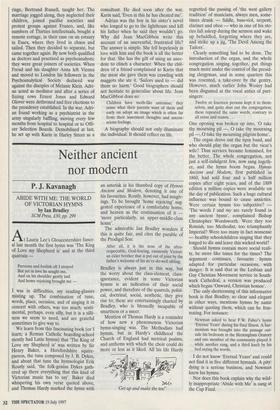Neither ancient nor modern
P. J. Kavanagh ABIDE WITH ME: THE WORLD OF VICTORIAN HYMNS by Ian Bradley SCM Press, £.30, pp. 299 At Laurie Lee's Gloucestershire funer- al last month the first hymn was 'The King of Love my Shepherd is' and at the third quatrain —
Perverse and foolish oft I strayed But yet in love he sought me, And on his shoulder gently laid And home rejoicing brought me -
I was in difficulties, my reading-glasses misting up. The combination of tune, words, place, occasion, and of singing it in concert with others, was too much; senti- mental, perhaps, even silly, but it is a silli- ness we seem to need, and are grateful sometimes to give way to.
We learn from this fascinating book (or I learn; a Roman Catholic boarding-school mostly had Latin hymns) that 'The King of Love my Shepherd is' was written by Sir Henry Baker, a Herefordshire squire- parson, the tune composed by J. B. Dykes, and about that tune the hymnologist Erik Routly said, 'the folk-genius Dykes gath- ered up there everything that this kind of Victorian music has to say'. Baker died whispering his own verse quoted above, and Thomas Hardy marked the hymn with an asterisk in his thumbed copy of Hymns Ancient and Modern, denoting it one of his favourites. Routly, however, had misgiv- ings. To be brought 'home rejoicing' sug- gested experience of a comfortable home, and heaven as the continuation of it 'more particularly, an upper-middle-class home'.
The admirable Ian Bradley wonders if this is quite fair, and cites the parable of the Prodigal Son:
After all, it is the nose of the ultra- respectable, God-fearing, eminently Victori- an elder brother that is put out of joint by the father's welcome of his ne'er-do-well sibling.
Bradley is always just in this way, but the worry about the class-element, class- ignorance, evident in some Victorian hymns is an indication of their social power, and therefore of the quarrels, politi- cal, doctrinal, social, aesthetic, they give rise to; these are entertainingly charted by Bradley, who is blessedly incapable of smartness or a sneer.
Mention of Thomas Hardy is a reminder of how new a phenomenon Victorian hymn-singing was. The Methodists had hymns, but in Hardy's childhood the Church of England had metrical psalms, and anthems with which the choir could do more or less as it liked. All his life Hardy 'Get up and make the tea!' regretted the passing of 'the west gallery tradition' of musicians, always men, some- times drunk — fiddle, bass-viol, serpent, clarinet and oboe — who in one of his sto- ries fall asleep during the sermon and wake up befuddled, forgetting where they are, and strike up a jig, 'The Devil Among the Tailors'.
Clearly something had to be done. The introduction of the organ, and the whole congregation singing together, put things much more under the control of the presid- ing clergyman, and in some quarters this was resented, a take-over by the gentry. However, much earlier John Wesley had been disgusted at the vocal antics of part- singers:
Twelve or fourteen persons kept it to them- selves, and quite shut out the congregation; these repeated the same words, contrary to all sense and reason . . .
One opening was broken up into, '0 take thy mourning pil 0 take thy mourning pil 0 take thy mourning pilgrim•home'.
The organ drove out the tipsy band, and who should play the organ but the vicar's wife? Thus services became feminised, for the better. The whole congregation, not just a self-indulgent few, now sang togeth- er, and the hymn boom began. Hymns Ancient and Modem, first published in 1860, had sold four and a half million copies after eight years, and of the 1889 edition a million copies were available on the day of publication. Such a'huge cultural influence was bound to cause anxieties. Were certain hymns too subjective? 'The words I and my are rarely found in any ancient hymn', complained Bishop Christopher Wordsworth. Were they too Romish, too Methodist, too triumphantly Imperial? Were too many in fact nonsense — healthy schoolchildren singing that they longed to die and leave this wicked world?
Should hymns contain more social reali- ty, be more like tunes for the times? The argument continues, favourite hymns adapted for particular occasions, with danger. It is said that at the Lesbian and Gay Christian Movement service in South- wark Cathedral, a version was produced which began 'Onward, Christian homos'.
The only shortcoming of this informative book is that Bradley, so clear and elegant in other ways, mentions hymns by name without quoting them, which can be frus- trating. For instance:
Newman asked to hear F.W. Faber's hymn 'Eternal Years' during his final illness. A har- monium was brought into the passage out- side his bedroom in the Birmingham Oratory and one member of the community played it while another sang, and a third knelt by his bed saying the words.
I do not know 'Eternal Years' and could not find it in five different hymnals. A pity: dying is a serious business, and Newman knew his hymns.
Nor does this book explain why the wild- ly inappropriate 'Abide with Me' is sung at the Cup Final.


























































 Previous page
Previous page